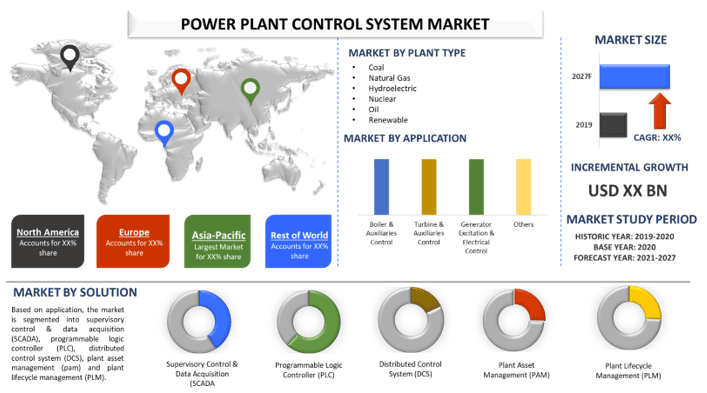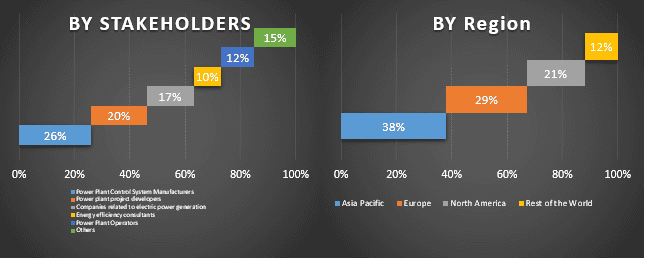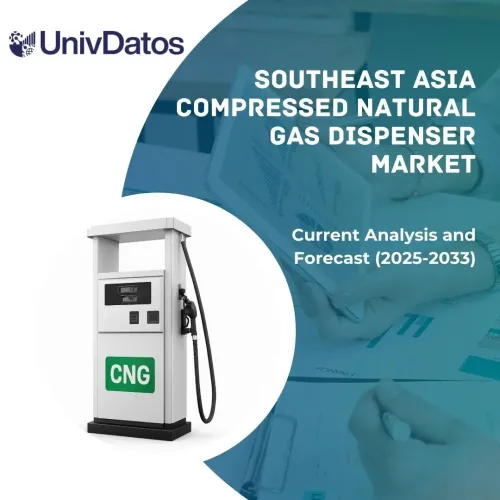- Home
- About Us
- Industry
- Services
- Reading
- Contact Us
Power Plant Control System Market: Current Analysis and Forecast (2019-2027)
Emphasis on Plant Type (Coal, Natural Gas, Hydroelectric, Nuclear, Oil and Renewable); By Application (Boilers and Auxiliaries Control, Turbine and Auxiliaries Control, Generator Excitation and Electrical Control and Others), Component (Hardware and Software), Solution (Supervisory Control & Data Acquisition (SCADA), Programmable Logic Controller (PLC), Distributed Control System (DCS), Plant Asset Management (PAM) and Plant Lifecycle Management (PLM)); and Region and Country

Global power plant control system market is expected to exceed the market valuation of more than US$8 billion by 2027, demonstrating a growth of above 6% during the forecast period (2021-2027). Rising need for zero downtime power supply solutions for critical power applications is the major driver of the power plant control system market. Moreover, increase in demand for electricity across the world, majorly in developing nations, is anticipated to fuel the operating efficiency of power plant control systems market. These systems help improve operational efficiency of power plants which is expected to augment the power plant control systems.
The outbreak of COVID-19 has adverse impact on the power plant control system market. The lockdown restrictions around the globe has shut down all the industries activities. Further, industry executives are anticipating delivery and construction slowdowns, because of the closure of industries to reduce the spread of coronavirus and since the workers started getting sick.
The outbreak of COVID-19 has adverse impact on the power plant control system market. The lockdown restrictions around the globe has shut down all the industries activities. Further, industry executives are anticipating delivery and construction slowdowns, because of the closure of industries to reduce the spread of coronavirus and since the workers started getting sick. Hence, affected the power plant control system market.
Different Components of Power plant control system, 2020

ABB, Mitsubishi Electric, Siemens, Schneider Electric, Emerson, General Electric, Hitachi, Omron, Rockwell, Toshiba. Several M&As along with partnerships have been undertaken by these players to facilitate customers with hi-tech and innovative products/technologies.
Insights Presented in the Report
“Amongst Plant Type, renewable segment holds the major share”
Based on plant type, the power plant control system market is segmented into coal, natural gas, hydroelectric, nuclear, oil and renewable. The renewable segment is likely to account for the largest share of the power plant control system market during 2021–2027. The global shift in power generation technology from fossil fuel to renewables in the key markets of Europe, North America, and Asia Pacific is expected to be the major driver for this category during the forecast period.
“Amongst Application, turbine and auxiliaries control segment holds the major share”
Based on application, the power plant control system market is divided into boilers and auxiliaries control, turbine and auxiliaries control, generator excitation and electrical control and others. Currently, market is dominated by turbine and auxiliary control. The growing number of installations of wind power plants, especially in Europe and North America, along with continuing coal power plant investments in Asia Pacific, is expected to be the key driving factor for the growth of the turbine & auxiliaries control segment.
“Amongst Solution, distributed control system (DCS) Segment is likely to hold major share during forecast period”
Based on solution, the market is segmented in to supervisory control & data acquisition (SCADA), programmable logic controller (PLC), distributed control system (DCS), plant asset management (pam) and plant lifecycle management (PLM). The Distributed Control System (DCS) segment is expected to hold larger share during the forecast period due to the increasing number of DCS power plants across the globe.
“Asia Pacific represents one of the largest markets of Global Power plant control system Market”
For a better understanding of the market dynamics of the global power plant control system market, a detailed analysis was conducted for different regions including Asia Pacific, North America, Europe and Rest of the World. Asia-Pacific held the largest market share due to increased power consumption, rising influx of renewable sources in the energy mix, and renovation, modernization, and upgradation of aging power plants in the region.
Reasons to buy this report:
- The study includes market sizing and forecasting analysis validated by authenticated key industry experts
- The report presents a quick review of overall industry performance at one glance
- The report covers an in-depth analysis of prominent industry peers with a primary focus on key business financials, product portfolio, expansion strategies, and recent developments
- Detailed examination of drivers, restraints, key trends, and opportunities prevailing in the industry
- The study comprehensively covers the market across different segments
- Deep dive regional level analysis of the industry
Customization Options:
Global Power plant control system market can further be customized as per the requirement or any other market segment. Besides this, UMI understands that you may have your own business needs, hence feel free to connect with us to get a report that completely suits your requirements.
Table of Content
Analyzing the historical market, estimation of the current market, and forecasting the future market of the global power plant control system market were the three major steps undertaken to create and analyze the adoption of power plant control system in major regions globally. Exhaustive secondary research was conducted to collect the historical market numbers and estimate the current market size. Secondly, to validate these insights, numerous findings and assumptions were taken into consideration. Moreover, exhaustive primary interviews were also conducted, with industry experts across the value chain of the global power plant control system market. Post assumption and validation of market numbers through primary interviews, we employed a top-down/bottom-up approach to forecasting the complete market size. Thereafter, market breakdown and data triangulation methods were adopted to estimate and analyze the market size of segments and sub-segments the industry pertains to. Detailed methodology is explained below:
Analysis of Historical Market Size
Step 1: In-Depth Study of Secondary Sources:
Detail secondary study was conducted to obtain the historical market size of power plant control system market through company internal sources such as annual report & financial statements, performance presentations, press releases, etc., and external sources including journals, news & articles, government publications, competitor publications, sector reports, third-party database, and other credible publications.
Step 2: Market Segmentation:
After obtaining the historical market size of the power plant control system market, we conducted a detailed secondary analysis to gather historical market insights and share for different segments & sub-segments for major regions. Major segments included in the report such as plant type, application, component, and solution. Further country-level analyses were conducted to evaluate the overall adoption of testing models in that region.
Step 3: Factor Analysis:
After acquiring the historical market size of different segments and sub-segments, we conducted a detailed factor analysis to estimate the current market size of power plant control system market. Further, we conducted factor analysis using dependent and independent variables such as various components of power plant control system and application of power plant control system. A thorough analysis was conducted for demand and supply-side scenarios considering top partnerships, merger and acquisition, business expansion, and product launches in the power plant control system market sector across the globe.
Current Market Size Estimate & Forecast
Current Market Sizing: Based on actionable insights from the above 3 steps, we arrived at the current market size, key players in the global power plant control system market, and market shares of the segments. All the required percentage shares split, and market breakdowns were determined using the above-mentioned secondary approach and were verified through primary interviews.
Estimation & Forecasting: For market estimation and forecast, weights were assigned to different factors including drivers & trends, restraints, and opportunities available for the stakeholders. After analyzing these factors, relevant forecasting techniques i.e., top-down/bottom-up approach was applied to arrive at the market forecast about 2027 for different segments and sub-segments across the major markets globally. The research methodology adopted to estimate the market size encompasses:
- The industry’s market size, in terms of value (US$) and the adoption rate of power plant control system market across the major markets domestically
- All percentage shares, splits, and breakdowns of market segments and sub-segments
- Key players in the global power plant control system market in terms of solutions offered. Also, the growth strategies adopted by these players to compete in the fast-growing market
Market Size and Share Validation
Primary Research: In-depth interviews were conducted with the Key Opinion Leaders (KOLs) including Top Level Executives (CXO/VPs, Sales Head, Marketing Head, Operational Head, and Regional Head, Country Head, etc.) across major regions. Primary research findings were then summarized, and statistical analysis was performed to prove the stated hypothesis. Inputs from primary research were consolidated with secondary findings, hence turning information into actionable insights.
Split of Primary Participants in Different Regions

Market Engineering
Data triangulation technique was employed to complete the overall market estimation and to arrive at precise statistical numbers of each segment and sub-segment of the global Power plant control system market. Data was split into several segments & sub-segments post studying various parameters and trends in the areas of application and components of the global power plant control system market.
The main objective of the Global Power plant control system Market Study
The current & future market trends of global power plant control system market were pinpointed in the study. Investors can gain strategic insights to base their discretion for investments from the qualitative and quantitative analysis performed in the study. Current and future market trends were determined the overall attractiveness of the market at a regional level, providing a platform for the industrial participant to exploit the untapped market to benefit as a first-mover advantage. Other quantitative goals of the studies include:
- Analyze the current and forecast market size of power plant control system market in terms of value (US$). Also, analyze the current and forecast market size of different segments and sub-segments
- Segments in the study include areas of plant type, application, component and solution.
- Define and analysis of the regulatory framework for the power plant control system market industry.
- Analyze the value chain involved with the presence of various intermediaries, along with analyzing customer and competitor behaviors of the industry.
- Analyze the current and forecast market size of the power plant control system market for the major region.
- Major regions studied in the report include Asia Pacific, Europe, North America and Rest of the world.
- Company profiles of the power plant control system market and the growth strategies adopted by the market players to sustain in the fast-growing market
- Deep dive regional level analysis of the industry
Related Reports
Customers who bought this item also bought










